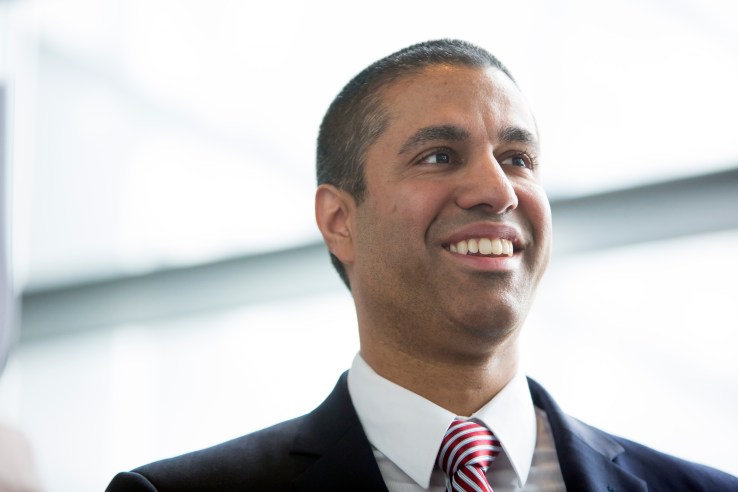FCC’s favors for Sinclair are the natural byproduct of a pro-industry agenda

Several Representatives are asking for an official explanation for why so many of the FCC’s actions seem to benefit Sinclair Broadcast Group, and a great New York Times report details a rather cozy relationship between the two. There’s no big conspiracy, though. Sinclair benefits because the FCC is deregulating the broadcast and broadband industries at their request and on their terms — as Chairman Pai has promised he would.
This isn’t some big expose article — it’s all on the record. Pai has repeatedly said — for years — that the FCC has overreached in its regulations of the broadcast, cable, telecommunications and broadband industries. Deregulation was the platform on which he pitched his chairmanship to the new administration.
FCC Commissioners are frequently industry veterans, and Pai is no exception. His law work for various major companies in the sector are right there on his disclosure form. Cablevision, Charter, Nielsen, Securus (it does prison calling systems, on which industry’s behalf Pai has interceded). Hell, he even worked for AOL, which (in its new form as Oath) owns TechCrunch.
Despite coming from the same pond, though, they don’t all walk the same line. Tom Wheeler was accused of being an industry plant and ended up rocking the boat harder than it’s been rocked in a long time. Pai is accused of being an industry plant and seems eager to cultivate that image.
Some of it’s right there for you to find in the official FCC documents. In February the FCC exempted ISPs with up to 250,000 subscribers from certain transparency rules. Two months before that, then-Commissioners Pai and O’Rielly wrote to the Cellular Telecommunications and Internet Association, the NCTA, the American Cable Association, the National Telecommunications Cooperative Association, the Competitive Carriers Association and the Wireless Internet Service Providers Association: “We will seek to revisit those particular requirements, and the Title II Net Neutrality proceeding more broadly, as soon as possible.”
And that’s exactly what they did. It’s not some smoking gun — just an example of the kind of friendly relationship that the two have had with industry associations.
Other items are a little more buried, but the NYT’s Freedom of Information Act requests did the trick. A former FCC staffer went to Sinclair Broadcasting and began work as an intermediary, eventually setting up a meeting between the company’s head and the new Chairman.
You can probably imagine what was said behind closed doors. It isn’t, “Here’s the big bribe I promised you, thanks for undermining consumers.” More like, “Glad to have a free market guy leading the Commission. You already know what needs to change.”
The next couple of months had the Chairman expanding exemptions to existing rules, retracting inquiries and studies that might have led to more regulation, standing by while pending regulations were nullified, abandoning the defense of challenged rules and fast-tracking mergers like Sinclair’s. This to-do list had been growing for years.
Then there’s all the stuff you find in the footnotes of the FCC’s net neutrality proposal. The studies are all from cable and broadband industry-backed groups, and the effects cited are all related to how the rules affect those industries. The economists cited talk about investment by cable companies, and jobs in broadband industries that might have been if not for the 2015 order. The means are suggested by the industry in order to accomplish the ends of the industry, with reasoning provided, conveniently enough, by the industry.
It’s also hard not to notice those who back the FCC’s actions and those who oppose it. On one side, pretty much everyone in the industries the FCC regulates. On the other, pretty much everyone who is or advocates for a customer of those industries.
So. While the example of Sinclair is serious enough that Representatives (including some who challenged the FCC’s anti-net neutrality proposal on Congressional intent grounds) would like to know more, it’s far from an isolated incident. Chairman Pai and many of those he works with are people who have championed deregulation and free market principles for years. Their interests are aligned with the companies that would benefit from deregulation and their actions publicly and deliberately pursue those shared interests. Don’t need a FOIA request to tell you that!
As for the request for clarification from Congress, the FCC declined to comment for now. The answers, to this inquiry and the comment regarding net neutrality, should make for interesting reading.
Featured Image: Eric Thayer/Getty Images